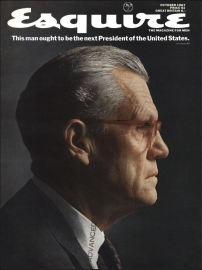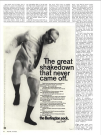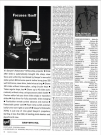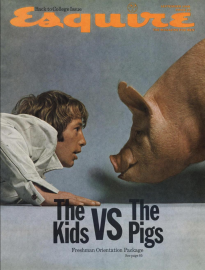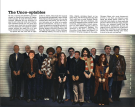Esquire
[...] The Mothers of Invention pose the
central question of contemporary art, namely: Are you putting
me on? Everything about them is ugly. Presiding genius Frank
Zappa seems to enjoy ugliness. His apparent motivation is distaste
for everything except modern classical music and the alienation
effect. "He's really weird," one graduate teenie-bopper confided
to me. "He doesn't even turn on." Well, I guess that says it.
Visually, the Mothers are reminiscent of The Fugs, old enough
so that all that hair looks more skanky than cute. Musically,
they are The Fugs in reverse. The Fugs are poets who perceived
the inherent sexuality of rock and decided it was an easy way
to go bardic. The Mothers are musicians who learned during long
hours in studios and crummy dance halls that rock was crude
and often deracinated. They parody every popular music from
Thirties-croon to The Supremes. (No Supremes fan could entirely
survive the sight of these three hairy freaks prancing from
mike to mike in a perfectly hideous and hilarious version of
"Baby Love.") Their music is the antithesis of soul: wooden
beat, trite riffs, inane lyrics. Vocalist Ray Collins can destroy
any style, and the musicianship behind him is always precisely
awful.
Because The Mothers are so good on stage (they have opened as
an off-Broadway musical) their recordings are underrated. Both
Freak Out!, a double record that is a great bargain
at stereo price, and Absolutely Free, conceived as
two short concerti, give the flavor of a Mothers performance.
But they do not bear repeated listening. Musical parody can
satisfy for just so long, and Zappa's tastes in social satire
are less than subtle – the "plastic people" he is always sniping
at are an unoriginal and rather stationary target. And when
he moves into the aleatory-Varese-jazz-rock composition that
seems his only true love he does not impress my admittedly untrained
ear.
I don't mean to be captious, though. See The Mothers if you
can. Zappa is very funny and reed man Bunk Gardner a great talent
(much better than Archie Shepp, who Gardner professes to admire
– along with Herman's Hermits). And if you can't see them, buy
a record – the Zappa-designed jacket of Absolutely Free
is almost worth the price. Absolutely Free is better
integrated, Freak Out! has more music. Your choice.
[...]
Source: robertchristgau.com, archive.org
By now, if you've paid attention, you know
enough to identify and despise all biggies, jocks and pigs.
So much for badness; now, precisely reflecting the true proportion
of good to evil in the real werld, your Orientation Committee
brings you one whole page of people upon whom you can safely
bestow love and admiration. But please be careful; studies indicate
the useful life of a hero barely exceeds that of a college president.
Up against the wall, from left to right: Arthur C, Clarke, whose
book 2001 inspired the movie first and explained it
later. George Wald, Harvard Nobel laureate, who one day emerged
above the System, saw the evils of war, and spoke out; on oldie
but a goodie. Daniel Cohthendit, German by birth, French by
agitation, proving the student rebellion knows no local dwelling.
Pier Paolo Pasolini, maker of Teorema, nuisance to
the Pope, the Martin Luther of films. Kathleen and Eldridge Cleaver,
two souls at home in Cuba, Algeria, anywhere there's no ice.
Laura Nyro, who showed the West that New York could have a sound.
Richard Farina, rising again for last year's freshmen, who revived
his example and his writings. Carlos Castaneda, anthropologist,
former apprentice to a Yaqui Indian magician, author of the
current underground Baedeker, The Teachings of Don Juan:
A Yaqui Way of Knowledge. Frank Zappa, head Mother (of
Invention) bringing messages by the media. Hermann Hesse, who
wrote Steppenwolf, Journey to the East, and
Magister Ludi; Dante and Kahlil Gibran rolled into
one sweet ball. Janis Joplin, in whom maybe ten percent of Bessie
Smith lives again. Stanley Kubrick, who redeemed himself from
the lower depths by making 2001, the first real religious
movie; one head saw it 250 times. Bobby Scale: with Huey in
jail, Eldridge on vacation and blacks shooting other blacks,
he must be the only cool head left.
Source: archive.org
1993 April
Vol. 119 No. 4
Cucamonga Years: The Early Works
of Frank Zappa, 1962-1964
By Mark Jacobson, p 38
Since FRANK ZAPPA has spent much of his
badbrain career perpetrating semibilious parody attacks on the
record biz, the arrival of these so-called Cucamonga sides,
documenting his pre-Mothers activities, provides arcane continuity:
He was always that way. Zappa, the white George Clinton, does
not appear on the tracks, but his ethos pervades. Ostensibly
regular radio fare, this Zappa-penned slag heap is chocked with
the usual meanspiritedness and contempt – all of which make
it exceedingly lovable, of course. The lyric sheet (mostly in
Japanese) includes this Bob Guy song; “I am writing to you from
Cucamonga,” it says. “Ha-ha! Cucamonga? The weather is lovely.
The nausea of noon.” Tin Pan Alley in the San Berdoo desert
must have been a trip.
Source: archive.org
Frank Zappa's Eastern European fans need
a new translator. The late rock star has a huge following in
Lithuania, where some of his admirers recently unveiled a six-foot-high
bust of Zappa. But a press release announcing the event made
even his most ardent fans seem unduly excited. It read: ZAPPA
HONORED WITH LITHUANIAN ERECTION.
Source: archive.org
